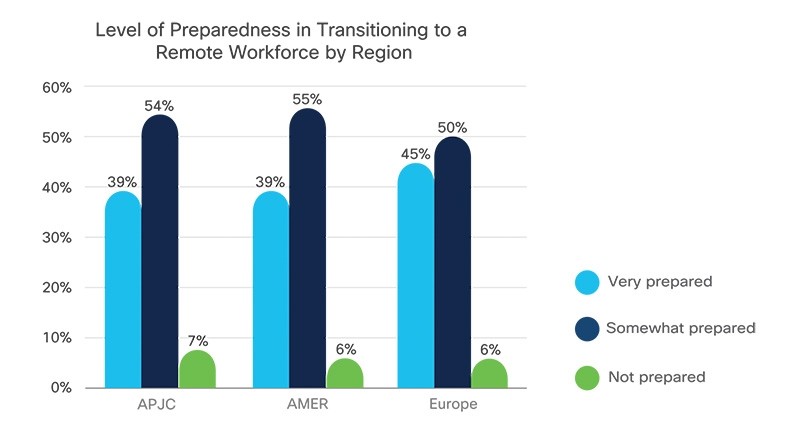Rise of remote working brings cybersecurity to fore
The study, titled Future of Secure Remote Work, surveyed over 3,000 IT decision-makers from 21 regions around the world. These decision-makers represent over 30 industries and a wide variety of company sizes, from small family-run businesses to large international enterprises.
The survey took place took place between June and September last year, with organisations having had several months to adjust to remote work environments and establish their procedures.
The study aims to better understand the challenges that companies faced in transitioning to remote work, while uncovering the state of their cybersecurity readiness, as well as the shifts in their priorities, policies, and investments as they prepare for a hybrid work environment that is likely here to stay.
Some 62 per cent of respondents said that more than half of the workforce had transitioned to working from home, while 37 per cent said that they expected to continue this arrangement even after COVID-19 comes to an end.
These numbers were very consistent regardless of organisation size, but there were some regional differences. American and European countries, which generally have experienced more unfavourable COVID-19 numbers, have substantially more of their workforces transitioned to remote work than Asia-Pacific groups.
Cisco’s global survey reads that organisations that had already been on a schedule of making incremental and continuous investments in security measures prior to COVID-19 ended up doing the best job of handling the transition to secure remote working.
Key recommendations from the study include integration of the handling of security and collaboration, the immediate implementation of a solid employee education programme, and the use of a zero-trust strategy in handling employee access management across the entire network.
 |
As for the Asia-Pacific, along with Japan and China, the study surveyed over 1,900 organisations to help Cisco understand how organisations within the region differed from their global counterparts in responding to COVID-19 and, subsequently, how they adapted to support their remote workforce and their future cybersecurity plans in enabling a distributed future of work.
While the majority of companies in that region are still navigating the demands and constraints of their new workplace dynamics, the good news is 70 per cent of respondents indicated that the COVID-19 situation will spur them to increase their cybersecurity investments. This makes it the region with the highest number of organisations that are looking to increase their cybersecurity investments amongst all three regions.
While developing countries like Vietnam, India, and Indonesia are ahead of the curve in their preparedness to transition to remote working, some of the world’s most technologically advanced countries like Japan (17 per cent) and South Korea (12 per cent) had a higher-than-average number of organisations that were not prepared for this shift.
With 67 per cent reporting to have been very prepared, Vietnamese enterprises had the highest proportion of respondents in the world that were ready to immediately transition to remote working, followed by the UK (59 per cent), India (54 per cent), and Indonesia (49 per cent).
Around 85 per cent of the region’s organisations indicated that security is extremely important or more important than before the pandemic. Within the region, the Philippines (93 per cent), Singapore (89 per cent), Thailand (87 per cent), and Vietnam (93 per cent) had more companies seeing cybersecurity as a top priority compared to regional and global averages.
What the stars mean:
★ Poor ★ ★ Promising ★★★ Good ★★★★ Very good ★★★★★ Exceptional
Related Contents
Latest News
More News
- Masan Consumer names new deputy CEO to drive foods and beverages growth (February 23, 2026 | 20:52)
- Myriad risks ahead, but ones Vietnam can confront (February 20, 2026 | 15:02)
- Vietnam making the leap into AI and semiconductors (February 20, 2026 | 09:37)
- Funding must be activated for semiconductor success (February 20, 2026 | 09:20)
- Resilience as new benchmark for smarter infrastructure (February 19, 2026 | 20:35)
- A golden time to shine within ASEAN (February 19, 2026 | 20:22)
- Vietnam’s pivotal year for advancing sustainability (February 19, 2026 | 08:44)
- Strengthening the core role of industry and trade (February 19, 2026 | 08:35)
- Future orientations for healthcare improvements (February 19, 2026 | 08:29)
- Infrastructure orientations suitable for a new chapter (February 19, 2026 | 08:15)

 Tag:
Tag:



















 Mobile Version
Mobile Version